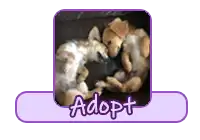
Estrella came to us during the colder months when she was found inside of an apartment complex. She was heavily pregnant and had her babies very soon after settling in. Now that her kittens are gone and she has had time to heal and decompress, she would really like to find the place she belongs. Estrella can coexist with other animals, and will only posture in defense. She is also very affectionate with people. Litterbox trained. 


|
TNR (Trap, Neuter, Release/Return)Here is where you will find our TNR request form and a few basics about how TNR works through our organization. In the state of Arizona, cats are considered "free roaming" creatures, and are not allotted the same standards as dogs. For example, there are no leash laws or mandatory rabies licensing for cats, and they will not be picked up by any of the state's animal control entities. Very rarely, will the Humane Society come out to pick up a cat, and only if it is sick/injured, and even then, only within their zones. Not all shelter/rescue group does TNR, but luckily, we do! "Kitten Season" can last for months, from February to Mid-September. Of course, there are births in between, but it isn't nearly as heavy as compared to "Kitten Season." A single female cat can go into heat as early as 4 MONTHS and produce up to 50 kittens in a YEAR. That is being generous with a smaller sized litter. Not to mention, Toms (un-neutered males) can get females pregnant every 3-4 weeks, even when the Queen is nursing a current litter. Unchecked, this creates a very large over pet population problem, especially for cats, which doesn't have a good outcome most of the time. If you find a feral cat or have a colony in your community that you would like to have spayed/neutered, then please fill out and submit the form below. It is extremely helpful if a donation is made, or even allowing the cat to recover in your home until he or she can be released back into their territory. Our organization will assist in trapping the cat, possible transportation, and support along the way. We also encourage you to seek support from your neighborhood or surrounding community. It is costly and time-consuming to Trap-Neuter- Release, so any type of cooperation is needed. We cannot cover the cost of every TNR, so please understand if we cannot accept your request.
All feral cats will be ear-tipped, which alerts other people that this cat had already been
fixed and can leave it alone. We also provide simple medical treatments such as ear mite
treatments, flea/tick treatments, an antibiotic injection, etc. Just because they are wild, doesn't
mean they must suffer. It is a human problem that has created this mess, and it is our duty to
do our part. |
